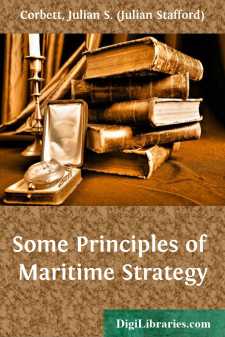Categories
- Antiques & Collectibles 13
- Architecture 36
- Art 48
- Bibles 22
- Biography & Autobiography 813
- Body, Mind & Spirit 142
- Business & Economics 28
- Children's Books 15
- Children's Fiction 12
- Computers 4
- Cooking 94
- Crafts & Hobbies 4
- Drama 346
- Education 46
- Family & Relationships 57
- Fiction 11828
- Games 19
- Gardening 17
- Health & Fitness 34
- History 1377
- House & Home 1
- Humor 147
- Juvenile Fiction 1873
- Juvenile Nonfiction 202
- Language Arts & Disciplines 88
- Law 16
- Literary Collections 686
- Literary Criticism 179
- Mathematics 13
- Medical 41
- Music 40
- Nature 179
- Non-Classifiable 1768
- Performing Arts 7
- Periodicals 1453
- Philosophy 64
- Photography 2
- Poetry 896
- Political Science 203
- Psychology 42
- Reference 154
- Religion 513
- Science 126
- Self-Help 84
- Social Science 81
- Sports & Recreation 34
- Study Aids 3
- Technology & Engineering 59
- Transportation 23
- Travel 463
- True Crime 29
Some Principles of Maritime Strategy
Categories:
Description:
Excerpt
INTRODUCTION
The Theoretical Study of War—Its Use and
Limitations
At first sight nothing can appear more unpractical, less promising of useful result, than to approach the study of war with a theory. There seems indeed to be something essentially antagonistic between the habit of mind that seeks theoretical guidance and that which makes for the successful conduct of war. The conduct of war is so much a question of personality, of character, of common-sense, of rapid decision upon complex and ever-shifting factors, and those factors themselves are so varied, so intangible, so dependent upon unstable moral and physical conditions, that it seems incapable of being reduced to anything like true scientific analysis. At the bare idea of a theory or "science" of war the mind recurs uneasily to well-known cases where highly "scientific" officers failed as leaders. Yet, on the other hand, no one will deny that since the great theorists of the early nineteenth century attempted to produce a reasoned theory of war, its planning and conduct have acquired a method, a precision, and a certainty of grasp which were unknown before. Still less will any one deny the value which the shrewdest and most successful leaders in war have placed upon the work of the classical strategical writers.
The truth is that the mistrust of theory arises from a misconception of what it is that theory claims to do. It does not pretend to give the power of conduct in the field; it claims no more than to increase the effective power of conduct. Its main practical value is that it can assist a capable man to acquire a broad outlook whereby he may be the surer his plan shall cover all the ground, and whereby he may with greater rapidity and certainty seize all the factors of a sudden situation. The greatest of the theorists himself puts the matter quite frankly. Of theoretical study he says, "It should educate the mind of the man who is to lead in war, or rather guide him to self-education, but it should not accompany him on the field of battle."
Its practical utility, however, is not by any means confined to its effects upon the powers of a leader. It is not enough that a leader should have the ability to decide rightly; his subordinates must seize at once the full meaning of his decision and be able to express it with certainty in well-adjusted action. For this every man concerned must have been trained to think in the same plane; the chief's order must awake in every brain the same process of thought; his words must have the same meaning for all. If a theory of tactics had existed in 1780, and if Captain Carkett had had a sound training in such a theory, he could not possibly have misunderstood Rodney's signal. As it was, the real intention of the signal was obscure, and Rodney's neglect to explain the tactical device it indicated robbed his country of a victory at an hour of the direst need. There had been no previous theoretical training to supply the omission, and Rodney's fine conception was unintelligible to anybody but himself....




